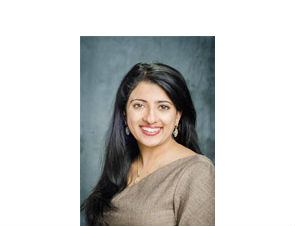How did you know you chose the right specialty in dermatology?
I was lucky enough to do my residency training at Eastern Virginia Medical School in Norfolk, VA, where we had a full-time pediatric dermatologist on staff (Dr. Judith Williams). Her clinical expertise and ability to put parents at ease in the face of complex problems made me realize how intellectually challenging pediatric dermatology could be, while being able to watch children grow up and impact their quality of life and self-esteem made me realize how meaningful it can be. I love that I can still feel like a big kid every day and that work feels fun.
What is a typical day like for you?
Most days I have clinic all day. We see patients every 15 minutes. I work two specialty clinics a month (vulvar dermatology with pediatric gynecology and rheum-derm with pediatric rheumatology), and procedures (such as excisions and laser cases) weekly. We have three attendings on staff and we share inpatient call equally, so if I am on service I will round with the resident after clinic is over. Once a week we have grand rounds with the residents; these alternate between NIH grand rounds, live patient grand rounds, and inpatient consult rotation presentations.
What do you feel is the key to a successful career in dermatology?
I believe that remaining curious and compassionate are the keys to being a successful physician. Dermatology is very intellectually stimulating, and there are always new things to learn, so remaining curious and continuing to challenge yourself is critical for continued professional development. For our patients, their skin disease can be very isolating; showing them compassion with a thoughtful manner and demonstration of your caring can help you to develop a relationship of trust and improve their outcomes and self-esteem.
What accomplishment are you most proud of in your career?
Teaching residents and medical students is the part of my career that makes me proudest. I always learn from them, and making an impact on the future generation of dermatologists means a lot to me personally, as my mentors have had such a huge influence on me. We also have the opportunity to work with primary care residents. Helping them get a better understanding of dermatology and feel more comfortable making diagnoses is very rewarding.
What advice do you have for new derms?
The first year out of training is a very steep learning curve, but always know you can call on your mentors for help with challenging cases. Dermatology is full of wonderful teachers, so you don’t ever have to feel like you’re managing a patient alone. I ask for help from my mentors with clinical challenges often, and they never fail to support me.
Second, never forget how hard you worked to get here and how fortunate you are. Sometimes it can be easy to become overwhelmed by the administrative challenges that we face in medicine now; but we have the privilege to affect patients’ lives in a very personal and special way, and that makes me feel truly lucky to get to do what I do.

